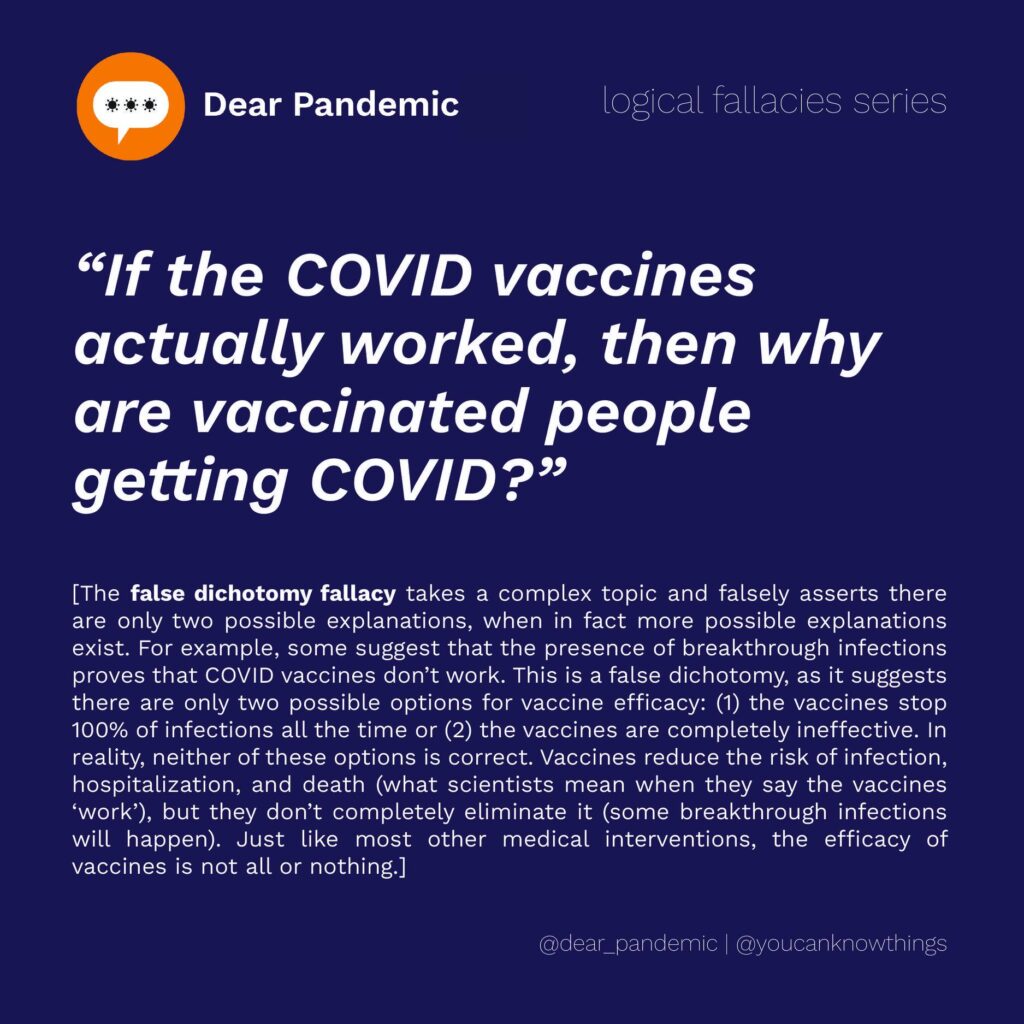At Dear Pandemic, we want to dish out science facts AND equip our readers with tools to make sense of data and science themselves.
This is the second post in an ongoing series by Dr. Kristen Panthagani of You Can Know Things, in which she dissects common logical fallacies that have led people astray during the pandemic.
⚠️ The False Dichotomy Fallacy
“If the COVID vaccines work, then why are vaccinated people getting COVID?”
This is an example of the false dichotomy fallacy, which takes a complex topic and falsely asserts there are only two possible explanations, when in fact more explanations exist. This one, also referred to as “binary thinking,” has shown up a lot on various topics around the pandemic. The false dichotomy tries to win an argument with a false position by proposing that the only other explanation is something clearly false, forcing the choice between two incorrect options. In reality, more options exist.
For example, some people suggest that the presence of infections after vaccination proves that COVID vaccines don’t work. This is a false dichotomy, as it suggests there are only two possible options for vaccine efficacy: (1) the vaccines stop 100% of infections or (2) the vaccines are completely ineffective. In reality, neither of these options is correct.
No vaccine is 100% perfect. When doctors and scientists say vaccines “work,” they mean that the vaccines significantly reduce the risk of getting infected, hospitalized, or dying. They do not mean that vaccines totally eliminate that risk. Vaccines, like all other medical interventions (and for that matter, most things in life) are not all or nothing.
When we say seat belts “work,” we don’t mean that a seat belt is a guarantee you will never die in a car crash. We mean that *compared to not wearing a seat belt* seat belts significantly reduce the risk of severe injury or death in a car crash. If someone wears a seat belt and still dies in a car crash, we don’t instantly conclude that seat belts are worthless. We conclude that they help in many cases, but aren’t perfect, and this was one of the tragic exceptions.
Likewise, vaccines reduce the risk of infection, hospitalization, and death, but they don’t completely eliminate it. Just how much the COVID vaccines reduce risk depends on multiple factors, including: 1. which clinical outcome we’re talking about (asymptomatic infection, symptomatic infection, long COVID, hospitalization, ICU admission, death, etc.), 2. which variant we’re talking about (original variant, alpha, delta, omicron, etc.), 3. which vaccine we’re talking about (J&J, Pfizer, Moderna, Oxford/AstraZeneca, Novavax, etc.), 4. which vaccine series we’re talking about (with booster, without booster), and 5. which population we’re talking about (immunocompromised, time since vaccination, history of prior infection(s), etc.).
Because of this, there isn’t one simple answer to the question “how well do COVID vaccines work?” The answer varies depending on the clinical outcome, variant, vaccine series, and population in question. However, one thing we can say is that the efficacy of vaccines is NOT all or nothing.
➡️ A note on logical fallacies:
Logical fallacies are common patterns of reasoning that seem true on the surface but have one or more critical flaws. At their root, many are oversimplifications–like a cognitive shortcut. They are appealing because they make something complex, like vaccine safety or the efficacy of masks, into something simple and easy to understand. However, this oversimplification often leaves out important details, leading to the wrong conclusions.
Logical fallacies are common and used by people arguing both for and against nearly every pandemic topic. They are NOT a sign of stupidity or lack of intelligence: they have tripped up nearly everyone at some point. And just because someone uses a fallacy in their argument doesn’t automatically mean they’re wrong — (that’s the fallacy fallacy!). It simply means they haven’t provided adequate evidence supporting their argument, but that evidence may in fact exist. It’s useful to recognize logical fallacies in our own thinking so we can make more accurate conclusions about the world around us.

More reading:


